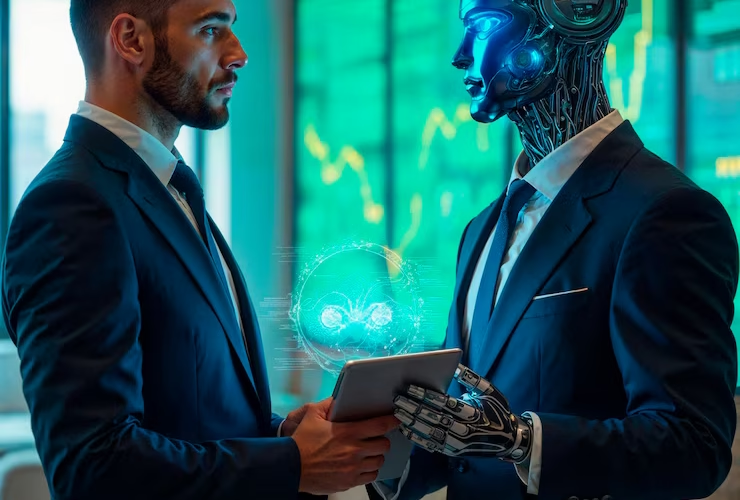Artificial Intelligence (AI) is no longer the stuff of science fiction— it’s here, now, and it’s changing the way marketers interact with audiences, personalize experiences, analyze data, make decisions, and grow revenue. Whether in predictive intelligence or content creation, AI is changing the world of digital marketing more rapidly than you could ever imagine.
Whether you’re a seasoned marketer, a business owner, or a student studying in a digital marketing masters program, anyone who wants to remain competitive needs to comprehend the increasing influence of AI in the world of digital marketing.
In this in-depth guide, we’re going to take a look at how AI is transforming digital marketing, the instruments driving the transformation, the pros and cons of AI integration, and how you can future-proof your career for an AI-dominated future with industry-focused online courses.
What Is Artificial Intelligence in Digital Marketing?
At its essence, AI is about machines or systems mimicking human intelligence — learning from data, recognizing patterns and making decisions. In digital marketing, AI can:
- Real-time processing of (massive) consumer data
- Customize customer experiences across all channels
- Automate everyday activities such as email segmenting or targeted ads
- Anticipate and track consumer actions and purchases
- Write articles using natural language generation (NLG)
- Take campaigns to the next level with dynamic data insights
And unlike traditional tools, AI isn’t just scripted: It is a self-improving algorithm, and makes marketing in the digital age all that much smarter and more efficient.
How Artificial Intelligence Is Revolutionizing Digital Marketing
Scalable Hyper-Personalization
We now live in a post -blast world of messages that apply to everyone. AI also helps marketers cater extremely personalized content to users based on what they’ve done, where they are, what they’ve purchased, or what they like.
Brands will be able to offer personalized product recommendations, dynamic landing pages and custom CTAs via AI-enabled tools such as Dynamic Yield and Salesforce Einstein, which can uplift engagement and conversion rates.
Smart Decision Making With Predictive Analytics
AI can examine historical data for patterns that will reveal what is likely to happen next, enabling businesses to predict customer behavior, forecast campaign performance, and target the best leads.
Adobe Sensei and IBM Watson Marketing allow companies to conduct predictive scoring, churn prediction and customer lifetime value modeling. They can then be used to better allocate budgets and target users more strategically.
AI-Powered Content Creation
AI writers such as ChatGPT, Jasper, and Copy. ai that allow marketers to draft high-performing blog posts, email subject lines, ad copy and social media posts in a matter of minutes.
While AI will never replace human creativity, it does increase production bandwidth, save costs and, aid in the task of scale content across channels. To help you satisfy our search intent and keyword density tools such as Clearscope and SurferSEO for AI-written content optimization.
Smart Chatbots and Virtual Assistants
AI chatbots can now manage inquiries, take appointments, resolve support tickets, and even help close sales. Solutions such as Drift, Intercom and Tidio employ NLP to answer in a conversational manner, thereby shortening wait times and improving customer satisfaction.
AI chatbots, used in e-commerce, service industry, even government and enterprise, operate around the 24\7 saving manpower to work on high-priority tasks.
Ad Targeting and Optimization at its Best
Programmatic advertising uses AI to purchase ad space in real time, delivering the most relevant ad to any given user, in the moment and across devices, using data signals such as web browsing history, device/ app usage, and online behavior signals.
Thanks to platforms such as Google Ads and Meta Ads, AI-enabled automation for budget optimization, A/B testing and predictive targeting are now part of the game—ensuring you get the most out of your ad spend.
Image recognition and voice search optimization
AI can analyze images and video to decipher the context of content, driving improved visual search (like Google Lens) and shoppable posts. Likewise, as voice assistants such as Alexa and Siri become more popular, AI is changing the way people use search engines.
Marketers are also beginning to optimize for conversational queries and long-tail keywords to rank in voice-based search results — a trend detailed in virtually all online training programs for SEO and voice tech.
AI and Its Advantages to Digital Marketing
Efficiency: automate repetitive tasks – e.g. reporting, data cleaning, segmentation.
Accuracy: AI has an ability to recognize patterns in consumer behavior that people might miss.
Speed: Decisions and optimizations in campaign you can make in real time.
Scalable: If necessary run and make optimizations on campaigns for thousands or millions of users.
The Benefits of Tunnel Targeting Cost Avoidance: Lower the work load on humans and prevent stupid spending on smart targeting.
Better ROI: Send more relevant messages that drive more engagement and conversions.
Challenges and Ethical Issues
While the advantages are abundant, there are a number of challenges for employing AI in digital marketing:
Data Privacy
AI is fueled by data – but in the age of GDPR, CCPA and other regulations, marketers have to make sure data is managed with privacy and ethical standards first. Consensual, transparent, secure data processing are prerequisites, not options.
Dependence on Algorithms
Reliance on automated AI tools can limit human guidance. Marketers need to keep their campaigns in line with brand values and a long-term strategy rather than what is the most efficient algorithmically.
Content Authenticity
Much of the content that gets created by AI isn’t authentic, however, and it often lacks emotional resonance. Editing and Storytelling By Humans are still a necessity for credibility and trust.
Applications in the Field in the UAE, US and Other Locations
In the UAE, luxury brands are tapping into AI to offer personalized shopping experiences for HNWIs. WhatsApp can be integrated with AI-powered chatbots and e-commerce platforms can deploy smart recommendations to promote upselling.
In the US, marketing departments across industries including pharma, SaaS, & retail are using predictive analytics and machine learning to predict churn, optimize patient engagement, and cross channel attribution.
These trends in the industry are reflected in more current curriculums for the best digital marketing masters programs, where AI tools, data literacy, and the fundamentals of machine learning for marketers are now prioritized in curriculum.
How to Upskill for the AI-Driven Marketing Revolution
To compete, today’s marketers need to see AI for what it is: an implementation — not something to fear. Learning AI applications, data analytics, and automation are no longer nice to have, but must-haves for professionals in all fields.
Here’s what you can do to protect yourself:
Join an AI-infused digital marketing program: Seek a digital marketing masters program that offers lessons on AI, marketing automation, and performance analysis.
Pursue specialized certifications: Products such as HubSpot, Google Ads, and Meta provide AI-related certifications to reinforce hands-on expertise.
Participate in online communities: IT companies have groups on LinkedIn, Reddit, or slack where you can interact with the next trends in AI.
Get flexible online training programs: Platforms like Simplilearn, Coursera and Udemy offer self-paced programs in AI for marketers, data-driven storytelling and marketing tech stacks.
Investing in AI literacy doesn’t require everyone to become a coder. It requires learning how to leverage AI-based tools to build smarter, more customized, and scalable marketing campaigns.
The Future of AI in Marketing
The following is what I believe we should anticipate to see as AI develops further:
- Emotion AI to interpret tone and sentiment on the fly
- AI influencers and avatars to take on niche worlds
- Broader application of AI to AR/VR marketing initiatives
- Seamless marketing, where the AI gives you the answers without you having to do anything.
- Scaling by the killer app: Testing and optimization of automated campaigns
Old news is fast becoming the new benchmark. AI will not replace marketers — but marketers who use AI will replace those who don’t.
Final Thoughts
AI is not disrupting digital marketing but also rewriting firm’s principles. Predictive personalization, real-time analytics, automated content, smarter targeting — AI is facilitating the delivery of more intelligent, personal, and data-driven experiences for marketers.
But as potent as A.I. is alone, it’s only as good as the strategy behind it. Marketers have to stay human: understanding emotions, storytelling, ethics — while leaving scale and speed to the AI.
If you’re interested in future-proofing your marketing career, it’s time to consider some sort of digital marketing masters program or specialized online training options that fit where the industry is going. The AI revolution is not really coming. It’s already here. Are you ready?




